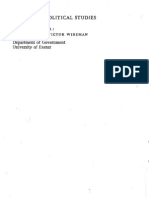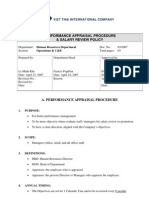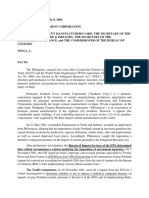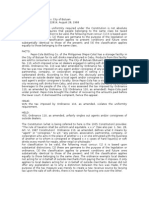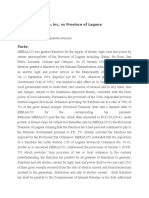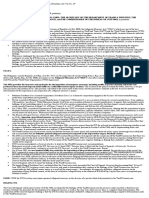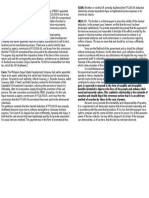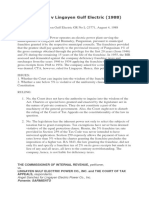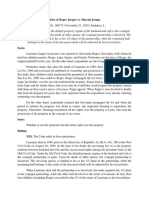Tio Vs Videogram Regulatory Board
Tio Vs Videogram Regulatory Board
Uploaded by
IshCopyright:
Available Formats
Tio Vs Videogram Regulatory Board
Tio Vs Videogram Regulatory Board
Uploaded by
IshOriginal Description:
Original Title
Copyright
Available Formats
Share this document
Did you find this document useful?
Is this content inappropriate?
Copyright:
Available Formats
Tio Vs Videogram Regulatory Board
Tio Vs Videogram Regulatory Board
Uploaded by
IshCopyright:
Available Formats
Tio vs.
Videogram Regulatory Board
151 SCRA 213
Facts:
Petitioner Valentino Tio, on behalf of other videogram operator, assailed the constitutionality of Presidential Decree No. 1987
entitled “An Act Creating the Videogram Regulatory Board” with broad powers to regulate and supervise the videogram industry.
Under Section 10 of the decree, the province shall collect a tax of 30% of the purchase price or rental rate for every sale or lease of a
videogram. On November 5, 1985, Presidential Decree No. 1994 amended the National Internal Revenue Code proving that each
processed video tape and cassette shall be subjected to annual tax of five pesos and those locally manufactured or imported blank
video tapes shall be subjected to sales tax.
The petitioner contends that the imposition of tax is germane a rider and not germane to the subject matter of the decree;
that the tax imposed is harsh, confiscatory, oppressive, and/or unlawful restraint of trade in violation of due process of the
Constitution; that it has no factual or legal basis; that it is an undue delegation of power and authority; that it is an ex- post facto law;
and that it is an over regulation of the video industry.
Issue:
Whether or not the imposition of the tax is constitutional.
Ruling:
Yes. The Supreme Court ruled that the tax imposition is constitutional.
The tax imposition is allied and germane to, and is reasonably necessary for the accomplishment of, the general object of the
decree, which is the regulation of the video industry through the Videogram Regulatory Board as expressed in its title. The tax provision
is not inconsistent with, nor foreign to that general subject and title.
The Supreme Court contended that tax does not cease to be valid merely because it regulates, discourages, or even definitely
deters the activities taxed. The power to impose taxes is one so unlimited in force and so searching in extent, that the courts scarcely
venture to declare that it is subject to any restrictions whatever, except such as rest in the discretion of the authority which exercises
it. The levy of the 30% tax is for a public purpose. It was imposed primarily to answer the need for regulating the video industry,
particularly because of the rampant film piracy, the flagrant violation of intellectual property rights, and the proliferation of
pornographic video tapes. It is inherent in the power to tax that a state be free to select the subjects of taxation, and it has been
repeatedly held that "inequities which result from a singling out of one particular class for taxation or exemption infringe no
constitutional limitation". Taxation has been made the implement of the state's police power.
You might also like
- Tolentino V Sec of Finance DigestsDocument5 pagesTolentino V Sec of Finance DigestsDeb Bie100% (10)
- Case Digest - TIO Vs Videogram Regulatory Board 151 SCRA 208Document2 pagesCase Digest - TIO Vs Videogram Regulatory Board 151 SCRA 208Lu Cas100% (15)
- ABAKADA GURO Partylist v. Executive Secretary (G.R. No. 168056)Document3 pagesABAKADA GURO Partylist v. Executive Secretary (G.R. No. 168056)Roward100% (6)
- DIGESTS - Pascual Vs Secretary of Public WorksDocument3 pagesDIGESTS - Pascual Vs Secretary of Public WorksPatricia Bautista100% (3)
- Tolentino vs. SecretaryDocument2 pagesTolentino vs. SecretaryVanityHughNo ratings yet
- Planters Products Vs Fertiphil Corporation Case DigestDocument2 pagesPlanters Products Vs Fertiphil Corporation Case DigestJC94% (18)
- Mactan Cebu Airport Authority Vs MarcosDocument2 pagesMactan Cebu Airport Authority Vs Marcos上原クリス100% (2)
- Tolentino Vs Sec of Finance DigestDocument1 pageTolentino Vs Sec of Finance Digestheymissruby100% (1)
- McPherson 1967 - Political ObligationDocument95 pagesMcPherson 1967 - Political ObligationCivis Vulgaris0% (1)
- Lutz Vs Araneta, G.R. No. L-7859, December 22, 1955Document1 pageLutz Vs Araneta, G.R. No. L-7859, December 22, 1955Celinka Chun100% (3)
- CIR v. Algue, Inc., G.R. No. L-28896Document1 pageCIR v. Algue, Inc., G.R. No. L-28896fay garneth buscato100% (2)
- 22 - Consti2-Manila Electric V Yatco GR 45697 - DigestDocument1 page22 - Consti2-Manila Electric V Yatco GR 45697 - DigestOjie SantillanNo ratings yet
- MACEDA Vs MacaraigDocument3 pagesMACEDA Vs MacaraigEllen Glae Daquipil100% (3)
- CIR V CA, CTA, YMCADocument2 pagesCIR V CA, CTA, YMCAChil Belgira100% (3)
- Lung Center v. Quezon City DIGESTDocument2 pagesLung Center v. Quezon City DIGESTJor LonzagaNo ratings yet
- Consti2Digest - Sison Vs Ancheta, 130 SCRA 654, 1984Document3 pagesConsti2Digest - Sison Vs Ancheta, 130 SCRA 654, 1984Lu Cas100% (1)
- Pepsi-Cola v. TanauanDocument2 pagesPepsi-Cola v. TanauanIshNo ratings yet
- Sum of MoneyDocument5 pagesSum of MoneyIshNo ratings yet
- Atlas Consolidated Mining Development Corp. v. CIRDocument1 pageAtlas Consolidated Mining Development Corp. v. CIRIsh50% (2)
- Management of Organization Theory - Case StudyDocument2 pagesManagement of Organization Theory - Case StudyChong King Wei33% (3)
- Theories of Distributive JusticeDocument8 pagesTheories of Distributive JusticeAnkit KumarNo ratings yet
- VTI - Performance Appraisal & Salary Review Policy - Jan07Document3 pagesVTI - Performance Appraisal & Salary Review Policy - Jan07preciouscaoNo ratings yet
- CofisaDocument2 pagesCofisaTony Starks0% (1)
- Valentin Tio Vs Videogram Regulatory Board GR No. L-75697: FactsDocument3 pagesValentin Tio Vs Videogram Regulatory Board GR No. L-75697: FactsJf Maneja100% (1)
- SOUTHERN CROSS CEMENT CORPORATION V PHILCEMCOR Digest PDFDocument4 pagesSOUTHERN CROSS CEMENT CORPORATION V PHILCEMCOR Digest PDFJay IgpuaraNo ratings yet
- G.R. No. 109289 October 3, 1994 TAN V. DEL ROSARIO FACTS FactsDocument1 pageG.R. No. 109289 October 3, 1994 TAN V. DEL ROSARIO FACTS FactsGeorginaNo ratings yet
- Tax Case Digest - Commissioner of Internal Revenue Vs Algue Inc GR No L-28896Document2 pagesTax Case Digest - Commissioner of Internal Revenue Vs Algue Inc GR No L-28896Anthony Pineda100% (1)
- Pepsi Cola v. City of Butuan DigestDocument2 pagesPepsi Cola v. City of Butuan DigestAnonymous PbYTL9zzco100% (1)
- Philex Mining Corporation vs. CIRDocument3 pagesPhilex Mining Corporation vs. CIRRobNo ratings yet
- JOHN HAY PEOPLES ALTERNATIVE COALITION Vs LIMDocument4 pagesJOHN HAY PEOPLES ALTERNATIVE COALITION Vs LIMKath Leen100% (1)
- Meralco vs. Province of Laguna DigestDocument3 pagesMeralco vs. Province of Laguna DigestMa Gabriellen Quijada-Tabuñag100% (2)
- Osmena v. Orbos DigestDocument3 pagesOsmena v. Orbos Digestpinkblush717No ratings yet
- Phil Guaranty V CIR DigestDocument2 pagesPhil Guaranty V CIR DigestMaria Reylan Garcia100% (2)
- 5 Chavez Vs Ongpin - DigestDocument2 pages5 Chavez Vs Ongpin - DigestGilbert Mendoza100% (5)
- Guingona v. CaragueDocument2 pagesGuingona v. CaragueArahbellsNo ratings yet
- Southern Cross Cement v. Cement Manufacturer's Assoc., G.R. No. 158540, 2005Document2 pagesSouthern Cross Cement v. Cement Manufacturer's Assoc., G.R. No. 158540, 2005JMae Magat100% (1)
- Abakada Guro Party-List Et. Al vs. Executive SecretaryDocument2 pagesAbakada Guro Party-List Et. Al vs. Executive SecretaryRaquel Doquenia100% (1)
- Pepsi-Cola Bottling Co. of The Phil., Inc. vs. City of Butuan, G.R. No. L-22814 (Case Digest)Document1 pagePepsi-Cola Bottling Co. of The Phil., Inc. vs. City of Butuan, G.R. No. L-22814 (Case Digest)AycNo ratings yet
- Abakada Guro Party List Case DigestDocument2 pagesAbakada Guro Party List Case DigestCarmelito Dante Clabisellas100% (1)
- Reyes v. AlmanzorDocument5 pagesReyes v. AlmanzorPatricia BautistaNo ratings yet
- Consti Art 8 - Baguio Market Vendors V Hon Cortes - AlegreDocument1 pageConsti Art 8 - Baguio Market Vendors V Hon Cortes - AlegreJoyce100% (2)
- Cervantes Vs Auditor General, 91 SCRA 359 Case Digest (Administrative Law)Document1 pageCervantes Vs Auditor General, 91 SCRA 359 Case Digest (Administrative Law)AizaFerrerEbina100% (4)
- CIR Vs CTA DigestDocument2 pagesCIR Vs CTA DigestAbilene Joy Dela Cruz71% (7)
- Lung Center VS Quezon CityDocument4 pagesLung Center VS Quezon CityJesstonieCastañaresDamayo100% (1)
- 1.PCGG vs. Cojuangco GR 147062 - FinalDocument4 pages1.PCGG vs. Cojuangco GR 147062 - FinalHoneyNo ratings yet
- Republic V IAC and Sps Pastor - DigestDocument2 pagesRepublic V IAC and Sps Pastor - DigestAiken Alagban LadinesNo ratings yet
- CIR V Solidbank CorporationDocument1 pageCIR V Solidbank CorporationFrancis Ray Arbon Filipinas100% (1)
- CIR v. Algue DigestsDocument1 pageCIR v. Algue Digestspinkblush717No ratings yet
- Tan v. Del Rosario DigestDocument2 pagesTan v. Del Rosario DigestDGDelfin100% (2)
- DIGEST John Hay Peoples Alternative Coalition Vs Lim DigestDocument2 pagesDIGEST John Hay Peoples Alternative Coalition Vs Lim DigestDhin Carag100% (5)
- CIR Vs Lingayen ElectricDocument2 pagesCIR Vs Lingayen ElectricRobert Quiambao100% (2)
- Daza V Singson Case DigestDocument2 pagesDaza V Singson Case DigestAra Belle0% (1)
- Sufficient Standard Test Is Used To Determine Whether There Is Undue DelegationDocument1 pageSufficient Standard Test Is Used To Determine Whether There Is Undue DelegationA M I R ANo ratings yet
- Phil. Guaranty Co., Inc. v. Cir, 13 Scra 775 - The Lifeblood Doctrine - DigestDocument2 pagesPhil. Guaranty Co., Inc. v. Cir, 13 Scra 775 - The Lifeblood Doctrine - DigestKate Garo100% (2)
- Guingona vs. CaragueDocument3 pagesGuingona vs. CaragueClavel TuasonNo ratings yet
- NPC v. City of Cabanatuan-DigestDocument2 pagesNPC v. City of Cabanatuan-DigestMartel John Milo100% (1)
- CONSTI LAW I - Confederation of Coconut V Aquino PDFDocument5 pagesCONSTI LAW I - Confederation of Coconut V Aquino PDFArriel NengascaNo ratings yet
- Lutz Vs AranetaDocument1 pageLutz Vs AranetaIshNo ratings yet
- Vera Vs CuevasDocument3 pagesVera Vs CuevasMike Llamas100% (4)
- GR 115455 Tolentino vs. Secretary of Finance Case DigestDocument1 pageGR 115455 Tolentino vs. Secretary of Finance Case DigestCyril Llamas100% (5)
- Sison Vs AnchetaDocument1 pageSison Vs AnchetaJf Maneja100% (3)
- Mciaa Vs Marcos DigestDocument1 pageMciaa Vs Marcos DigestKimberly RamosNo ratings yet
- Association of Customs Brokers Inc Vs The Municipality Board City of ManilaDocument2 pagesAssociation of Customs Brokers Inc Vs The Municipality Board City of ManilaYvon Baguio75% (4)
- British American Tobacco v. Camacho Case DigestDocument3 pagesBritish American Tobacco v. Camacho Case DigestMak Francisco100% (1)
- Tio Vs Videogram CasedigestDocument2 pagesTio Vs Videogram CasedigestAaron BurkeNo ratings yet
- Tio v. VideogramDocument2 pagesTio v. VideogramNezte VirtudazoNo ratings yet
- Tio Vs Videogram Regulatory BoardDocument2 pagesTio Vs Videogram Regulatory BoardAngeli CampanerNo ratings yet
- 10 OCEANIC WIRELESS NETWORK Vs CIRDocument3 pages10 OCEANIC WIRELESS NETWORK Vs CIRIsh100% (1)
- 58 MACEDA Vs MACARAIGDocument3 pages58 MACEDA Vs MACARAIGIshNo ratings yet
- CIR vs. Standard Insurance: SummaryDocument4 pagesCIR vs. Standard Insurance: SummaryIshNo ratings yet
- PSALM Vs CIRDocument2 pagesPSALM Vs CIRIshNo ratings yet
- 16 Republic Vs GMCC United Development CorpDocument2 pages16 Republic Vs GMCC United Development CorpIsh100% (1)
- Cir Vs Sekisui Jushi PH: Doctrine/SDocument2 pagesCir Vs Sekisui Jushi PH: Doctrine/SIshNo ratings yet
- 38 CIR Vs SEA GATEDocument4 pages38 CIR Vs SEA GATEIshNo ratings yet
- 18 M Lhuillier Vs CIRDocument2 pages18 M Lhuillier Vs CIRIshNo ratings yet
- 48 PH Natl Police Cooperative Vs CIRDocument2 pages48 PH Natl Police Cooperative Vs CIRIshNo ratings yet
- NTC Vs CA and PLDTDocument2 pagesNTC Vs CA and PLDTIsh100% (2)
- Justo Vs GalingDocument1 pageJusto Vs GalingIshNo ratings yet
- Lutz Vs AranetaDocument1 pageLutz Vs AranetaIshNo ratings yet
- Phil. Guaranty Co. v. CIRDocument2 pagesPhil. Guaranty Co. v. CIRIshNo ratings yet
- Vera v. FernandezDocument1 pageVera v. FernandezIshNo ratings yet
- 46-Quezon City Vs BayantelDocument3 pages46-Quezon City Vs BayantelIshNo ratings yet
- NPC Vs AlbayDocument1 pageNPC Vs AlbayIshNo ratings yet
- Chevron Philippines, Inc. vs. Bases Conversion Development Authority and Clark Development Corporation, G.R. No. 173863, September 15, 2010Document1 pageChevron Philippines, Inc. vs. Bases Conversion Development Authority and Clark Development Corporation, G.R. No. 173863, September 15, 2010Jeselle Ann VegaNo ratings yet
- The Roman Catholic Bishop of Tuguegarao Vs PrudencioDocument2 pagesThe Roman Catholic Bishop of Tuguegarao Vs PrudencioIshNo ratings yet
- CBK Power Co LTD Vs CIRDocument2 pagesCBK Power Co LTD Vs CIRIsh100% (1)
- MARCOS II Vs CADocument2 pagesMARCOS II Vs CAIshNo ratings yet
- CIR v. BPIDocument2 pagesCIR v. BPIIshNo ratings yet
- Heirs of Roger Jarque Vs Marcial JarqueDocument2 pagesHeirs of Roger Jarque Vs Marcial JarqueIsh100% (4)
- Certified List of Candidates For Congressional and Local Positions For The May 13, 2013 2013 National, Local and Armm ElectionsDocument2 pagesCertified List of Candidates For Congressional and Local Positions For The May 13, 2013 2013 National, Local and Armm ElectionsSunStar Philippine NewsNo ratings yet
- Miami BBG 10th Regional Board PacketsDocument10 pagesMiami BBG 10th Regional Board PacketsIlana LadisNo ratings yet
- Alfon vs. RepublicDocument2 pagesAlfon vs. RepublicJan Rhoneil Santillana100% (3)
- Iloilo City Regulation Ordinance 2008-225Document2 pagesIloilo City Regulation Ordinance 2008-225Iloilo City Council100% (1)
- ksp-151 Syrian Refugees Persuasive EssayDocument9 pagesksp-151 Syrian Refugees Persuasive Essayapi-350098277100% (1)
- Chapter 17 Section 1 and 4Document18 pagesChapter 17 Section 1 and 4api-206809924No ratings yet
- Project Ideas and ContactsDocument5 pagesProject Ideas and ContactsBorja Fahrenheit AtariNo ratings yet
- Amendments ListDocument16 pagesAmendments ListHariReddy GangavaramNo ratings yet
- ASUN Senate Report 74-25Document96 pagesASUN Senate Report 74-25Vis Lupi Est GrexNo ratings yet
- English Studies For Restaurant WorkersDocument1 pageEnglish Studies For Restaurant WorkersHarisKasimNo ratings yet
- SPA - April Lot 26Document2 pagesSPA - April Lot 26MJ CarreonNo ratings yet
- Section 1 of The Rizal LawDocument2 pagesSection 1 of The Rizal LawDaneca Mae Llorca MangaNo ratings yet
- Buyer's Request Form 1Document1 pageBuyer's Request Form 1April Givero SheaNo ratings yet
- Jadwal Daring I 2021-2022Document3 pagesJadwal Daring I 2021-2022RENI DWI JAYANTINo ratings yet
- Earth SummitDocument3 pagesEarth SummitRa Pa0% (1)
- Professional Military Education) Cap PeruDocument25 pagesProfessional Military Education) Cap PeruJuanCarlosL28No ratings yet
- Japanese Investment in The US and US-Japan Trade Problems, Akio Morita, Japan and The World Economy 3 (1991) 113-116 North HollandDocument4 pagesJapanese Investment in The US and US-Japan Trade Problems, Akio Morita, Japan and The World Economy 3 (1991) 113-116 North HollandAsc RaihanNo ratings yet
- OutDocument275 pagesOutSuriadi SamsuriNo ratings yet
- Badac Minutes April, 2023Document3 pagesBadac Minutes April, 2023gabitanalex9No ratings yet
- Egyptian President Mohamed Morsi's Victory SpeechDocument4 pagesEgyptian President Mohamed Morsi's Victory SpeechAndrew GhobrialNo ratings yet
- брсмDocument2 pagesбрсмMC NAZARUHANo ratings yet
- Appendix D - Integrity Pact (Form D1)Document2 pagesAppendix D - Integrity Pact (Form D1)Umair AfrimaNo ratings yet
- Nuclear Program of IranDocument85 pagesNuclear Program of IranemsigitarNo ratings yet
- RPS Appointment Order 2024Document12 pagesRPS Appointment Order 2024rajendramoond054No ratings yet
- The Bush Family: George W BushDocument180 pagesThe Bush Family: George W BushWilliam Litynski100% (4)








